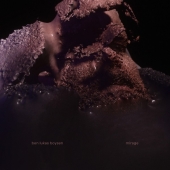
Boysen Ben Lukas
Mirage
Label: Erased Tapes
Genre: Electronica / Ambient / Experimental
Availability
- LP €22.99 Dispatched within 5-10 working days
Other Formats
Since the release of Spells, Ben continued to be in demand for his scoring abilities, collaborating with cellist and composer Sebastian Plano on the music for David OReilly’s landmark innovative video game Everything. It was added to the long list for the Best Animated Short at the 90th Academy Awards, making it the first video game to qualify for an Oscar. In 2019 Ben contributed to the Brainwaves project alongside fellow Erased Tapes artists Michael Price and Högni Egilsson in collaboration with a team of scientists at Goldsmiths University, London — linking states of consciousness and music. He also scored the soundtrack to the DAFF award-winning German TV show Beat, the feature film The Collini Case, and co-composed the music for the short film Manifesto with Nils Frahm, starring Cate Blanchett.
As with Gravity and Spells, Ben has an array of musical guests adorning Mirage, including long time collaborator, Berlin-based cellist and composer Anne Müller as well as Australian saxophonist and composer Daniel Thorne — for whom Ben wrote parts specifically, having heard his 2019 solo debut Lines of Sight. Lead track Medela features both and takes the listener on a kaleidoscopic journey that slides with ease across sonic terrains. By the end it’s difficult to tell what exactly was heard.
“I wanted to experiment with blending these recordings with 100% artificial elements, often to points where an instrument becomes an abstraction of what it was and the musicians’ presence in the song is much more of an important DNA string in the song rather than an obvious layer”
— Ben Lukas Boysen
